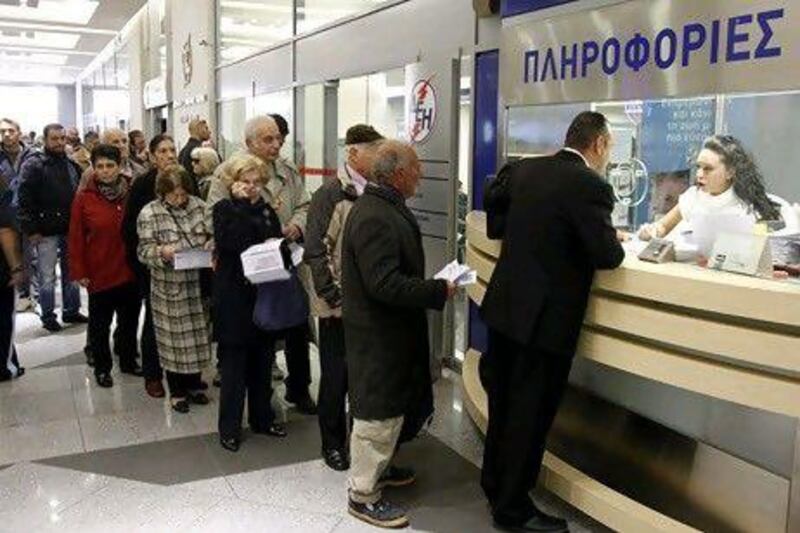Stock markets around the world plunged yesterday as Greece's prime minister shocked investors by calling for a referendum on the country's bailout package.
Road to ruin or recovery?
Euro Zone The National charts Europe's struggles as it attempts to through of financial crisis. Learn more
The surprise move by George Papandreou is a huge setback for plans to restore stability to the euro zone because the Greek people are expected to oppose the bailout, which comes with harsh austerity measures.
"The consequences are huge. Greece as a country could be in default in a month's time, and people will believe that the steps taken by politicians in the last few months was just to buy time," said Mohammed Ali Yasin, the chief investment officer at CAPM Investment in Abu Dhabi. "From a macro picture, it is very difficult for economies to grow when austerity measures are taking place, so a slowdown of the world economy will be inevitable."
Global bourses, including local markets, were left nursing heavy losses yesterday and analysts said the Middle East was unlikely to avoid serious pain.
The sell-off was exacerbated by weak manufacturing data from China and the UK, as well as a major intervention by Japan in the currency markets on Monday.
Mario Draghi's first day as the president of the European Central Bank was marred by the tumbling stock markets and widening credit spreads on Italian debt as investors feared financial contagion.
A euro-zone agreement had been made last week to write off half of what Greece owes banks, increase the size of a recently established bailout fund and recapitalise banks.
"Uncertainty has returned once again to markets. No doubt the phone lines between Berlin, Paris and Athens will be ringing hot today," said Azad Zangana, the Europe economist at Schroders, an investment management house.
"Despite the good package announced last week by euro-zone leaders, last night's shock announcement from the Greek prime minister that Greece will hold a referendum on the package risks a disorderly outcome," he said yesterday.
European bourses were worst hit by the news as Germany's DAX fell more than 5 per cent, France's CAC fell 4.2 per cent and the Eurostoxx 50 dropped 4.5 per cent.
Oil prices also declined. Brent crude futures for delivery next month lost as much as 1.9 per cent to US$107.44 a barrel, and crude traded in New York lost as much as 2.7 per cent to US$90.65 a barrel.
In Asia, Hong Kong's Hang Seng Index was down 2.4 per cent while Japan's Nikkei was 1.7 per cent lower at the close.
European bank shares fell hardest as France's Société Générale plunged 13 per cent and BNP Paribas and Crédit Agricole fell more than 10 per cent each.
In the UAE, the Dubai Financial Market General Index dropped 1.8 per cent, the biggest decline since October 4, to 1,382.71, and the Abu Dhabi Securities Exchange General Index slipped 0.2 per cent to 2,496.37.
Experts in the Middle East said it was "impossible" for regional banks not to feel the European crisis.
"It's impossible to isolate banking systems around the world," said Ghanem Nuseibeh, the founder of Cornerstone Global Associates, a political and economic consultancy.
"Regional banks are connected to European banking system. There will be a domino effect if there is further deterioration."
Underpinning the effect of global uncertainty on regional bank lending, Standard & Poor's warned this week that Gulf companies would struggle to refinance debts in the medium term.
"Higher rated issuers should have no problem rolling over debt, but those farther down the rating scale may find it more difficult to do so," said the credit analyst Tommy Trask. "Overreliance on short-term bank debt also exposes issuers to refinancing risks down the line."
In Europe, the cost of insuring against default on European debt increased the most in almost four months. The spread on credit default swaps (CDS) on 15 governments soared 27 basis points to 331 basis points.
An increase in the CDS spreads shows a higher level risk in buying European debt.
As investors rushed to safe havens, German 10-year bond yields fell to 1.7 per cent, while yields on Italy's government 10-year debts rose to 6.33 per cent, a euro-era high.
halsayegh@thenational.ae






